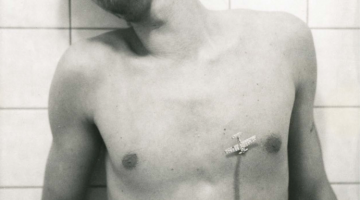Lisa Solomon’s current solo show “Sen” at Fouladi Projects in San Francisco mines the artist’s personal history and heritage, and is centered around the number 1,000. Solomon’s intricate and ethereal works, constructed primarily from thread, colored pencil and duralar utilize traditional domestic handiwork techniques to implicate broader social themes.
Solomon’s interest in the number 1,000 stems from her Japanese heritage and the ritualistic fixation Japanese culture places on that number. On the eastern wall of the gallery, Solomon has delicately installed one thousand hand-crocheted lace doilies made by forty-five women in different parts of the world. Each set of ten doilies is made from a unique color of thread and the colors are arranged in a modified rainbow order starting with red and ending with neutrals, shifting from light to dark value in each hue. From each set of hues, one thread traces a path to the floor, connecting with its original form, a ball of twine. The result is an elegant manifestation of the artist’s commitment to using what are generally considered menial tasks to examine the political implications of that categorization.
Solomon’s use of needlework and crochet may carry with it the heavy load of gender archetypes and a forced ideal of femininity for some, while for others it would clearly demonstrate a historical and personal devotion to the act of making and finding power in that act. When asked about her choice of materials Solomon writes: “The very nature of the materials I use relegates my work to the domestic/feminine sphere and I’m completely unapologetic about that. I do try to subtly poke fun at modernist and contemporary art conventions through my own means of interrogation and work.”
Indeed “Sen” evokes a compelling relationship between the powerlessness of committing to repetitive, menial tasks and the potential for large amounts of small gestures to add up to a powerful whole, epitomizing the idea that ordinary actions can have a reverberating effect. In her “Senbazaru” and “Senninbari” pieces Solomon traces that idea back to the Japanese traditions of folding one thousand paper cranes and stitching one thousand knots as a means of conjuring good luck or a granted wish.

Lisa Solomon “Senbazaru (red)” , 15 x 15 inches, Colored Pencil and Embroidery on Duralar. Image courtesy Lisa Solomon and Fouladi Projects.

Lisa Solomon “Senbazaru (red)” detail. Colored Pencil and Embroidery on Duralar. Image courtesy Lisa Solomon and Fouladi Projects.
Apart from gender identity and cultural signifiers, Solomon’s work poses interesting questions about accepted notions of Art and Craft. She states: “I believe that people still ultimately divide things into the two camps. ART and CRAFT. There is still a hierarchy. I think people still look down on craft. I’ve also noticed that lately some people really go overboard to place themselves into either camp. Function EQUALS craft or Art EQUALS concept. Then people try to bridge the gap by devising conceptual craft camps, or talk about the importance of the art nouveau “craftsman” movement. Sometimes I just want to boil it down to this: I want art that is well crafted and craft that is artful.”
Fouladi Projects’ exhibition program integrates contemporary art and functional works. It’s an interesting territory to occupy, full of subtlety and re-contextualization. Solomon offers a refreshing take on the differentiation: “Maybe a better judgment is what is authentic? Does something speak to you – be it “art” or “craft?”
“Sen” is on view through December 21st.
For more information visit Fouladi Projects, San Francisco.
-Contributed by Kelly Inouye
Previous posts by Kathryn McKinney (below)
–Review: Jennie Ottinger, “Members Only” at Johansson Projects, Oakland
–Review: Sarah Cain’s “Loud Object” at Anthony Meier Fine Arts, San Francisco
–Review: “Kota Ezawa: Boardwalk” at Yerba Buena Center for the Arts, San Francisco.





